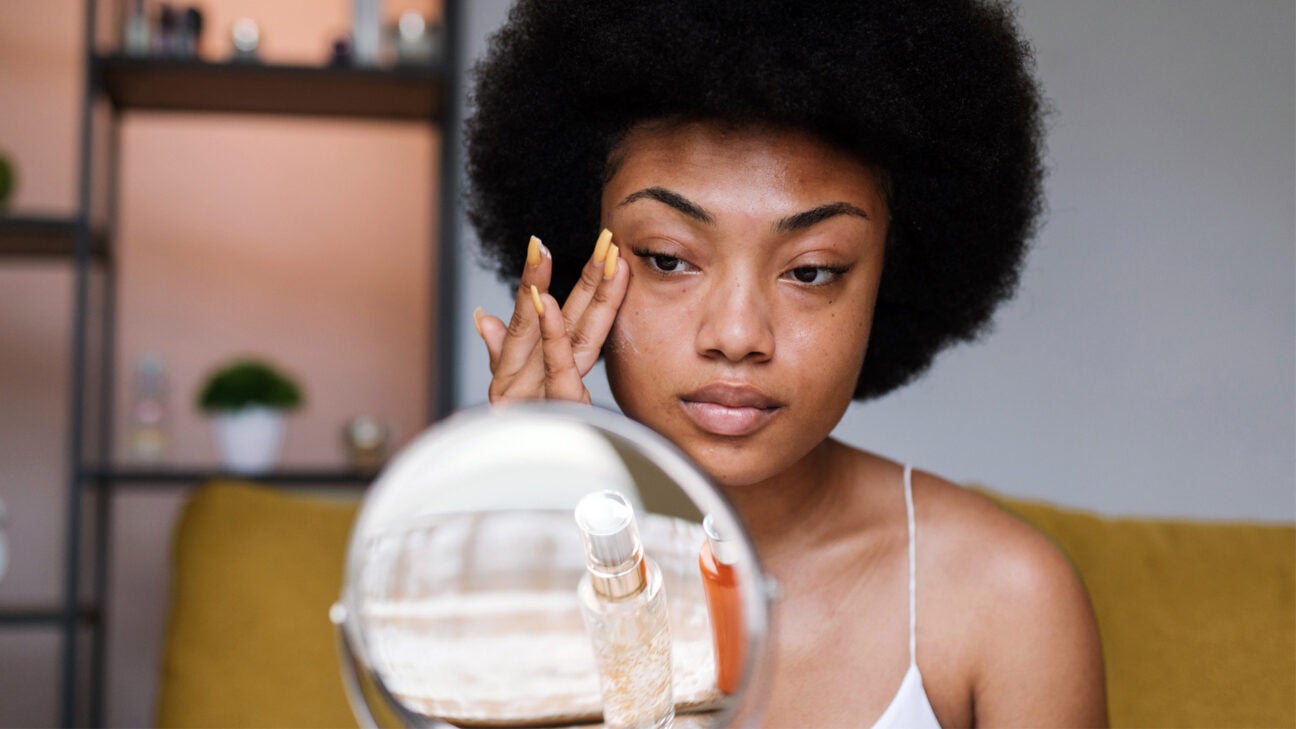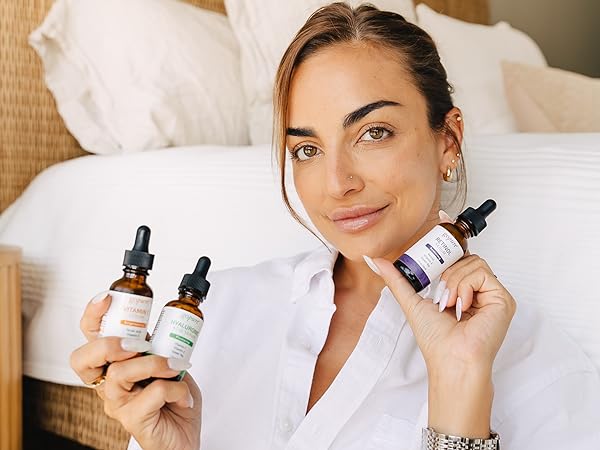The Secret to Glowing Skin: Best Skincare Ingredients
Achieving glowing skin is a desire shared by many, but it often requires understanding the right ingredients to include in your skincare routine. This comprehensive guide will explore the best skincare ingredients known for their transformative effects, ensuring your skin radiates health and vitality.
Hyaluronic Acid: The Ultimate Hydrator
 Hyaluronic acid is a naturally occurring substance in the body, known for its incredible ability to retain moisture. It can hold up to 1,000 times its weight in water, making it a powerhouse ingredient in skincare.
Hyaluronic acid is a naturally occurring substance in the body, known for its incredible ability to retain moisture. It can hold up to 1,000 times its weight in water, making it a powerhouse ingredient in skincare.
Benefits for the Skin
- Deep Hydration: Hyaluronic acid penetrates deep into the skin, providing intense hydration that helps plump and firm the skin, reducing the appearance of fine lines and wrinkles.
- Improved Skin Texture: Regular use can smoothen the skin's texture, giving it a softer, more youthful appearance.
- Enhanced Skin Barrier: It strengthens the skin’s barrier, helping to protect against environmental aggressors and preventing moisture loss.
How to Use
Incorporate a hyaluronic acid serum into your daily skincare routine. Apply it after cleansing and before moisturizing to maximize its hydrating benefits.
Vitamin C: The Brightening Antioxidant
 Vitamin C is a potent antioxidant that plays a crucial role in collagen production and neutralizing free radicals. It's renowned for its brightening and anti-aging properties.
Vitamin C is a potent antioxidant that plays a crucial role in collagen production and neutralizing free radicals. It's renowned for its brightening and anti-aging properties.
Benefits for the Skin
- Brightening: Vitamin C helps fade dark spots and hyperpigmentation, giving the skin a more even and radiant complexion.
- Collagen Boosting: It stimulates collagen production, which helps reduce the appearance of fine lines and wrinkles.
- Protection: The antioxidant properties protect the skin from damage caused by UV exposure and pollution.
How to Use
Look for a stable form of vitamin C, such as L-ascorbic acid or sodium ascorbyl phosphate, and use it in the morning after cleansing and toning, followed by sunscreen for added protection.
Retinol: The Anti-Aging Powerhouse
 Retinol, a derivative of vitamin A, is one of the most researched and proven ingredients for anti-aging. It promotes cell turnover and stimulates collagen production.
Retinol, a derivative of vitamin A, is one of the most researched and proven ingredients for anti-aging. It promotes cell turnover and stimulates collagen production.
Benefits for the Skin
- Anti-Aging: Retinol reduces the appearance of fine lines and wrinkles, giving the skin a more youthful look.
- Improved Skin Tone: It helps fade dark spots and improve skin tone, making the complexion more even.
- Acne Treatment: Retinol is also effective in treating acne by preventing clogged pores and reducing inflammation.
How to Use
Introduce retinol gradually into your skincare routine, starting with a lower concentration and using it at night. Follow up with a moisturizer to minimize potential irritation.
Niacinamide: The Multitasking Wonder
Niacinamide, also known as vitamin B3, is a versatile ingredient that offers a range of benefits for various skin types and concerns.
Benefits for the Skin
- Pore Minimizing: Niacinamide helps reduce the appearance of enlarged pores, giving the skin a smoother look.
- Anti-Inflammatory: It has anti-inflammatory properties that help soothe irritated skin and reduce redness.
- Strengthening: Niacinamide strengthens the skin barrier, helping to retain moisture and protect against environmental stressors.
How to Use
Niacinamide can be used both morning and night, making it a flexible addition to any skincare routine. It pairs well with other active ingredients, enhancing their efficacy.
Alpha Hydroxy Acids (AHAs): The Exfoliation Experts
AHAs are a group of natural acids found in various fruits and foods. The most common AHAs used in skincare include glycolic acid, lactic acid, and citric acid.
Benefits for the Skin
- Exfoliation: AHAs exfoliate the skin by dissolving dead skin cells, revealing a brighter and more radiant complexion.
- Skin Renewal: They stimulate cell turnover, which helps improve skin texture and tone.
- Hydration: Certain AHAs, like lactic acid, have hydrating properties that keep the skin moisturized.
How to Use
Incorporate AHA products like exfoliating toners or serums into your routine a few times a week. Always follow up with sunscreen, as AHAs can make your skin more sensitive to the sun.
Ceramides: The Skin Barrier Protectors
Ceramides are lipid molecules found in high concentrations within cell membranes. They play a crucial role in maintaining the skin's barrier function.
Benefits for the Skin
- Barrier Repair: Ceramides help restore and maintain the skin’s natural barrier, preventing moisture loss and protecting against environmental damage.
- Moisturization: They keep the skin hydrated and prevent dryness and irritation.
- Anti-Aging: By maintaining a healthy skin barrier, ceramides help reduce signs of aging and keep the skin looking youthful.
How to Use
Look for ceramide-rich moisturizers or serums, and use them as part of your daily skincare routine, especially if you have dry or sensitive skin.
Peptides: The Collagen Boosters
Peptides are short chains of amino acids that serve as building blocks for proteins like collagen and elastin, which are essential for maintaining skin’s structure and firmness.
Benefits for the Skin
- Anti-Aging: Peptides stimulate collagen production, which helps reduce the appearance of fine lines and wrinkles.
- Firming: They improve skin elasticity, making it appear firmer and more youthful.
- Repairing: Peptides aid in skin repair and regeneration, promoting a healthier complexion.
Peptides can be found in serums, creams, and masks. Incorporate them into your routine for added anti-aging benefits and improved skin health.
Squalane: The Hydrating Oil
Squalane is a hydrogenated version of squalene, a natural oil produced by the skin. It’s lightweight, non-greasy, and highly effective at moisturizing the skin.
Benefits for the Skin
- Hydration: Squalane provides intense hydration without leaving a greasy residue, making it suitable for all skin types.
- Antioxidant: It has antioxidant properties that protect the skin from environmental damage.
- Soothing: Squalane is known for its soothing and anti-inflammatory properties, making it ideal for sensitive or irritated skin.
How to Use
Squalane can be used as a standalone moisturizer or added to other skincare products. It’s versatile and can be used both morning and night for optimal hydration.
Conclusion
Understanding and incorporating the right skincare ingredients can make a significant difference in achieving glowing, healthy skin. Each ingredient discussed—hyaluronic acid, vitamin C, retinol, niacinamide, AHAs, ceramides, peptides, and squalane—offers unique benefits that address various skin concerns. By selecting products with these powerful ingredients and using them consistently, you can transform your skincare routine and enjoy a radiant complexion.
References
- Harvard Health: Benefits of Hyaluronic Acid
- American Academy of Dermatology: Vitamin C
- Mayo Clinic: Retinol
- Healthline: Niacinamide
- WebMD: AHAs in Skincare
- Dermatology Times: Benefits of Ceramides
- Cleveland Clinic: Peptides
- Byrdie: Squalane
- The Derm Review: Skincare Ingredients
- Verywell Health: Best Skincare Ingredients














































